人教版七年级英语下册第一单元知识点汇总总结
人教版七年级下册英语Unit 1 知识点语法归纳总结

人教版七年级下册英语Unit 1 知识点语法归纳总结Unit 1 What’s the matter?1.短语归纳2.典句必背3.用法集萃(1)当别人心情不好,身体不适或遇到麻烦时,我们可以用如下表达表示关心:❖What’s the matter?❖What’s the matter with you?❖What’s wrong with …?❖What’s the trouble\problem with …?(2)英语中常用have描述身体的不适,此时have意为“患有”,常用结构:①have a + 疾病例:have a cold 感冒;have a fever 发烧;have a cough 咳嗽②have a + 身体部位-ache例:have a headache 头痛;have a toothache 牙痛③have a sore + 身体部位例:have a sore throat 咽喉痛;have a sore back 背痛(3)lie down躺下;tell lies/a lie 说谎(4)maybe & may be①maybe,“或许”,常用于句首,表示可能性,后加句子。
例:Maybe you are right.②may be,是情态动词+be的结构,意为“可能,也许”,后加名词、代词或形容词。
例:He may be angry.(5)sound like & sound①sound like+名词/代词/从句例:It sounds like you don’t know the truth. It sounds like a good idea.②sound+形容词,“听起来,好像”,例:The music sounds nice.(6)…when the driver saw an old man lying on the side of the road. ……这时司机看到意为老人躺在路边。
人教版七年级英语下册各单元知识点汇总
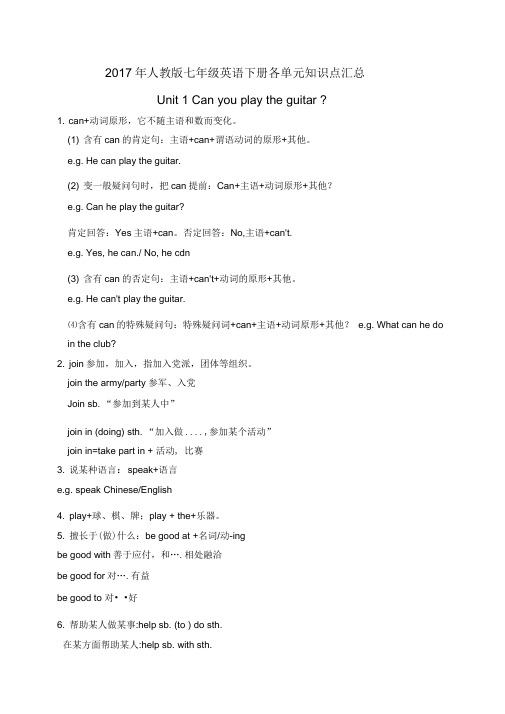
2017年人教版七年级英语下册各单元知识点汇总Unit 1 Can you play the guitar ?1. can+动词原形,它不随主语和数而变化。
(1) 含有can的肯定句:主语+can+谓语动词的原形+其他。
e.g. He can play the guitar.(2) 变一般疑问句时,把can提前:Can+主语+动词原形+其他?e.g. Can he play the guitar?肯定回答:Yes主语+can。
否定回答:No,主语+can't.e.g. Yes, he can./ No, he cdn(3) 含有can的否定句:主语+can't+动词的原形+其他。
e.g. He can't play the guitar.⑷含有can的特殊疑问句:特殊疑问词+can+主语+动词原形+其他? e.g. What can he doin the club?2. join参加,加入,指加入党派,团体等组织。
join the army/party 参军、入党Join sb. “参加到某人中”join in (doing) sth. “加入做.... ,参加某个活动”join in=take part in + 活动, 比赛3. 说某种语言:speak+语言e.g. speak Chinese/English4. play+球、棋、牌;play + the+乐器。
5. 擅长于(做)什么:be good at +名词/动-ingbe good with善于应付,和….相处融洽be good for对….有益be good to 对• •好6. 帮助某人做某事:help sb. (to ) do sth.在某方面帮助某人:help sb. with sth.7. 想要做某事:want to do sth想要某人做某事:want sb. to do sth.需要某人/时间做某事:need sb./some time to do sth.叫某人做某事:ask sb. to do sth.教某人做某事:teach sb. to do sth.让某人做某事:let sb. do sth.8. ---What club do you want to join ?---1 want to join the chess club and the basketball club.9. ---What club does Tom want to join?---He wants to join the swimming club .10. He can't play the violin or the piano.Can you help kids with swimming?11. ---Why do you want to join the English club?---Because I want to learn Englishwell.12. go for a swim=go swimming 去游泳13. show sb. sth.=show sth. to sbll 示某物给某人看Please show some pictures to me.=Please show me some pictures.14. talk to/with sb.和••交谈;talk about 谈论某事15. 交朋友make friends16. 在周末:on the weekendon weekends/at weekendsUnit 2 What time do you go to school ?1、what time和when引导的特殊疑问句。
七年级下册英语unit1重点知识点总结

七年级下册英语unit1重点知识点总结七年级下册英语Unit 1重点知识点总结Unit 1重点学习了“Where’s your pencil?” 这个话题,主要围绕日常用品、家庭成员等进行语言学习。
本文将总结本单元的重点知识点,帮助同学们巩固掌握学习内容。
一、日常用品本单元主要学习了日常用品的英文表达。
1. 学习了常见的文具:pen(笔)、pencil(铅笔)、ruler(尺子)、eraser(橡皮)、sharpener(铅笔刀)等。
例句:- Where’s your pencil case?- It’s on the desk.2. 学习了身体部位:head(头)、shoulder(肩膀)、arm(手臂)、hand(手)、finger(手指)、leg(腿)、foot(脚)、toe (脚趾)等。
例句:- Where’s your pen?- It’s in my hand.3. 学习了家庭成员的英文表达:father(爸爸)、mother(妈妈)、sister(姐姐)、brother(弟弟)等。
例句:- Who’s that woman?- She’s my mother.二、疑问句的构成学习了构成疑问句的两种方式:1. 直接在句首加助动词或be动词构成疑问句。
例句:- Is this your eraser?- Where is your pencil case?2. 利用疑问词(what, where, who, how等)构成疑问句。
例句:- What’s your name?- Who’s that man?三、物品位置的表达学习了表达物品在哪里的有关词汇和语句。
1. Where is …? = Where’s …?例句:- Where is your pencil case? - Where’s your book?2. It’s on / in / under + 名词例句:- Where’s your dictionary?- It’s in my bag.4. There is / are …例句:- Is there a pen in your pencil case? - Are there any books on the desk?四、注意事项1. 名词单数变复数例句:- pencil → pencils- book → books2. 对话中的语气句子最后需要加上问号。
人教版英语七年级下册第一单元单词、短语、知识点清单
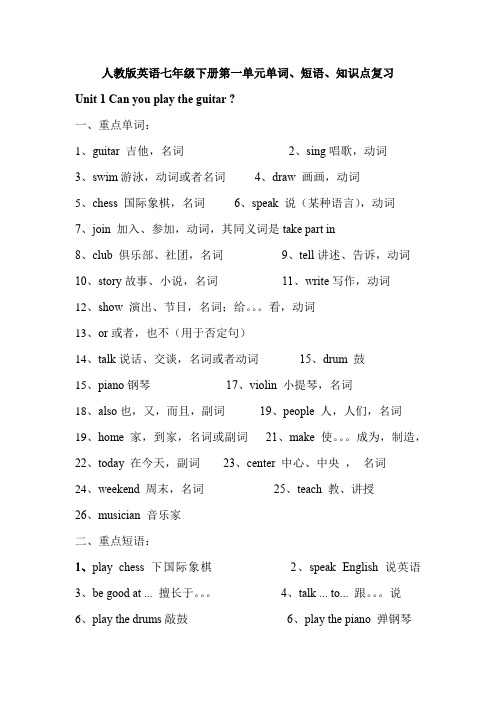
人教版英语七年级下册第一单元单词、短语、知识点复习Unit 1 Can you play the guitar ?一、重点单词:1、guitar 吉他,名词2、sing唱歌,动词3、swim游泳,动词或者名词4、draw 画画,动词5、chess 国际象棋,名词6、speak 说(某种语言),动词7、join 加入、参加,动词,其同义词是take part in8、club 俱乐部、社团,名词9、tell讲述、告诉,动词10、story故事、小说,名词11、write写作,动词12、show 演出、节目,名词;给。
看,动词13、or或者,也不(用于否定句)14、talk说话、交谈,名词或者动词15、drum 鼓15、piano钢琴17、violin 小提琴,名词18、also也,又,而且,副词19、people 人,人们,名词19、home 家,到家,名词或副词21、make 使。
成为,制造,22、today 在今天,副词23、center 中心、中央,名词24、weekend 周末,名词25、teach 教、讲授26、musician 音乐家二、重点短语:1、play chess 下国际象棋2、speak English 说英语3、be good at ... 擅长于。
4、talk ... to... 跟。
说6、play the drums敲鼓6、play the piano 弹钢琴7、play the violin 拉小提琴8、make friends 结交朋友9、be good with... 善于应对。
,对。
有办法10、help sb. with sth.在某方面帮助某人11、on the weekend =on weekends 在周末三、语法和知识点。
1、掌握情态动词can的用法。
Can是情态动词,后面接动词原形,使用时,没有人称和数的区别。
I can \ we can \ he can \ she can \ they can情态动词can 引导的肯定句:主语+can+动词原形例句:I can draw. \ She can speak English. \ They can play the piano.(肯定句)情态动词can 引导的否定句:主语+can’ t+动词原形例句:I can’t play chess. (否定句)Alice can’t draw well.(否定句)情态动词can 引导的一般疑问句:Can + 主语+ 动词原形+ 其它?例句:Can you play the piano ? (一般疑问句)Can Tom speak English well ?(一般疑问句)其回答形式:Yes , 主语+ can. No , 主语+ can’t.2、掌握play 的用法。
初中英语人教版七年级下册Unit1单词和知识点整理
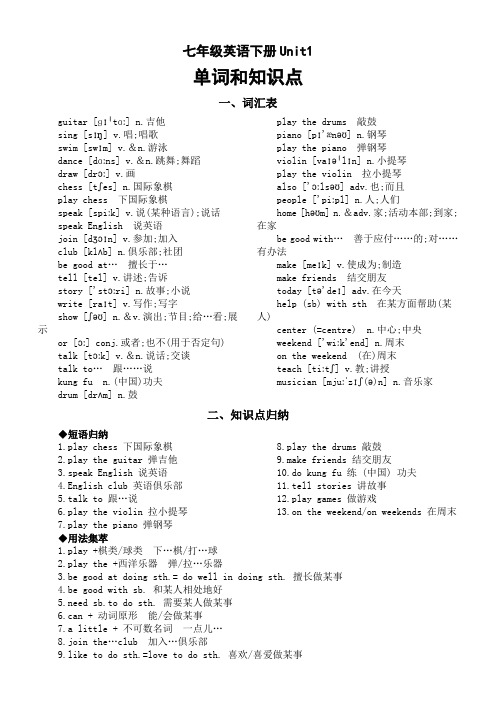
七年级英语下册Unit1 单词和知识点一、词汇表guitar [ɡɪˈtɑː] n.吉他sing [sɪŋ] v.唱;唱歌swim [swɪm] v.&n.游泳dance [dɑːns] v.&n.跳舞;舞蹈draw [drɔː] v.画chess [tʃes] n.国际象棋play chess 下国际象棋speak [spiːk] v.说(某种语言);说话speak English 说英语join [dʒɔɪn] v.参加;加入club [klʌb] n.俱乐部;社团be good at…擅长于…tell [tel] v.讲述;告诉story ['stɔːri] n.故事;小说write [raɪt] v.写作;写字show [ʃəʊ] n.&v.演出;节目;给…看;展示or [ɔː] conj.或者;也不(用于否定句)talk [tɔːk] v.&n.说话;交谈talk to…跟……说kung fu n.(中国)功夫drum [drʌm] n.鼓play the drums 敲鼓piano [pɪ'ænəʊ] n.钢琴play the piano 弹钢琴violin [vaɪəˈlɪn] n.小提琴play the violin 拉小提琴also ['ɔːlsəʊ] adv.也;而且people ['piːpl] n.人;人们home [həʊm] n.&adv.家;活动本部;到家;在家be good with…善于应付……的;对……有办法make [meɪk] v.使成为;制造make friends 结交朋友today [tə'deɪ] adv.在今天help (sb) with sth 在某方面帮助(某人)center (=centre) n.中心;中央weekend ['wiːk'end] n.周末on the weekend (在)周末teach [tiːtʃ] v.教;讲授musician [mjuːˈzɪʃ(ə)n] n.音乐家二、知识点归纳◆短语归纳1.play chess 下国际象棋2.play the guitar 弹吉他3.speak English 说英语4.English club 英语俱乐部5.talk to 跟…说6.play the violin 拉小提琴7.play the piano 弹钢琴8.play the drums 敲鼓9.make friends 结交朋友10.do kung fu 练 (中国) 功夫11.tell stories 讲故事12.play games 做游戏13.on the weekend/on weekends 在周末◆用法集萃1.play +棋类/球类下…棋/打…球2.play the +西洋乐器弹/拉…乐器3.be good at doing sth.= do well in doing sth. 擅长做某事4.be good with sb. 和某人相处地好5.need sb.to do sth. 需要某人做某事6.can + 动词原形能/会做某事7.a little + 不可数名词一点儿…8.join the…club 加入…俱乐部9.like to do sth.=love to do sth. 喜欢/喜爱做某事◆典句必背1.—Can you draw? 你会画画吗?—Yes, I can./No, I can’t.是的,我会。
新版人教版七年级英语上下册各单元知识点总结
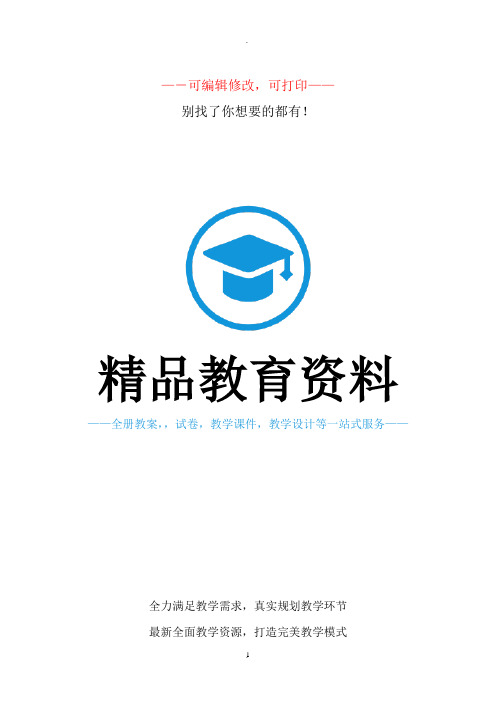
—-可编辑修改,可打印——别找了你想要的都有!精品教育资料——全册教案,,试卷,教学课件,教学设计等一站式服务——全力满足教学需求,真实规划教学环节最新全面教学资源,打造完美教学模式七年级上册Starter unit 11.短语归纳:good morning 早上好 good afternoon 下午好 good evening 晚上好name list 名单 an English name 英文名字2.必背典句:(1)Good morning! 早上好!(2)Good afternoon! 下午好!(3)Good evening 晚上好!3.英语中常见的问候语(1)Hello! “你好!”是比较随便、不分时间的一种问候语,通常用于打招呼、打电话。
表示惊讶或引起对方注意。
对方应答仍用Hello!(2)Hi! “你好!”的使用比hello!更随便,在年轻人中使用更为普遍。
(3)Nice to meet you! “很高兴见到你!”是两个初次见面、经介绍相识的人互相打招呼的用于。
回答时可以说Nice to meet you, too.或者Me, too.表示“见到你很高兴”(4)How do you do? “你好!”用于初次见面,是非正式的打招呼用语。
对方应答语应是“How do you do?”(5)How are you? 表示问候How are you? 意为“你好吗?”,为询问对方身体状况的问候语,应答语一般是“I’m fine. Thank you. / I’m very well. Thank you. / I’m OK.How are you? 的其他用法:习惯上回答完别人的问候后,常可反问对方的身体状况,此时可用How are you?也可用And you? “你呢?”4.大写字母的用法:(1) 在英语中,句子的第一个单词的第一个字母都应大写。
Sit down, please. 请坐。
人教版七年级下册英语第一单元知识点整理
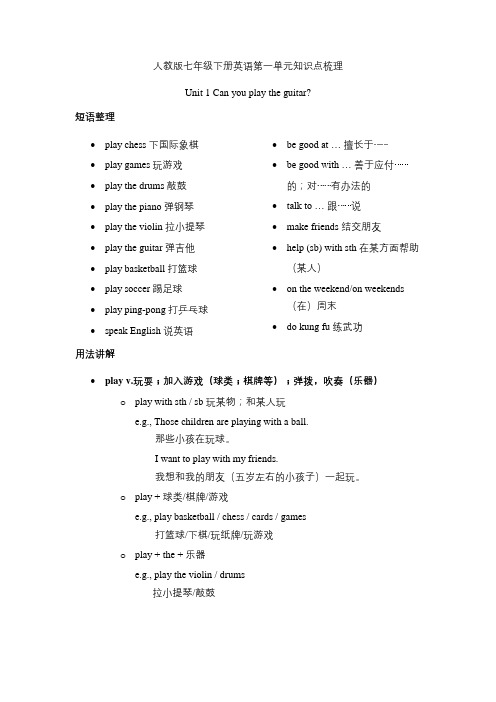
人教版七年级下册英语第一单元知识点梳理Unit 1 Can you play the guitar?短语整理•play chess 下国际象棋•play games 玩游戏•play the drums 敲鼓•play the piano 弹钢琴•play the violin 拉小提琴•play the guitar 弹吉他•play basketball 打篮球•play soccer 踢足球•play ping-pong 打乒乓球•speak English 说英语•be good at … 擅长于……•be good with … 善于应付……的;对……有办法的•t alk to … 跟……说•make friends 结交朋友•help (sb) with sth 在某方面帮助(某人)•on the weekend/on weekends (在)周末•do kung fu 练武功用法讲解•play v.玩耍;加入游戏(球类;棋牌等);弹拨,吹奏(乐器)o play with sth / sb 玩某物;和某人玩e.g., Those children are playing with a ball.那些小孩在玩球。
I want to play with my friends.我想和我的朋友(五岁左右的小孩子)一起玩。
o play + 球类/棋牌/游戏e.g., play basketball / chess / cards / games打篮球/下棋/玩纸牌/玩游戏o play + the + 乐器e.g., play the violin / drums拉小提琴/敲鼓•be good at … 擅长于……;精通……o be good at sth / doi ng sth = do well in sth / do ing sthe.g., She is good at English / playing basketball= She does well in English / playing basketball•be good with … 善于应付……的;对……有办法的o He is good with words. 他能说会道。
七年级下册第一单元笔记英语人教版

七年级下册第一单元笔记英语人教版Unit 1 FriendshipKey Words:1. Friendship: a relationship of mutual affection between two or more people.2. Trust: a firm belief in the reliability, truth, or ability of someone or something.3. Support: to give assistance or encouragement to someone.4. Loyalty: the quality of being faithful or devoted to someone or something.5. Betrayal: the act of being disloyal or unfaithful to someone.6. Confide: to tell someone about a secret or private matter while trusting them not to repeat it.7. Apologize: to express regret for something that one has done wrong.8. Forgive: to stop feeling angry or resentful towards someone for an offense, flaw, or mistake.Notes:1. Friendship is important for a person's well-being and happiness. It involves trust, support, loyalty, and understanding.2. Trust is essential in any friendship. Without trust, a friendship cannot survive.3. Friends should support each other in times of need. It is important to be there for each other when the other person needs help.4. Loyalty is a key aspect of friendship. Being loyal means staying true to your friends, even when things get tough.5. Betrayal can destroy a friendship. It is important to always be honest and loyal to your friends.6. Confiding in your friends can help strengthen your bond. It is important to trust your friends with your thoughts and feelings.7. Apologizing when you have done something wrong is crucial in maintaining a friendship. It shows that you acknowledge your mistake and are willing to make amends.8. Forgiveness is important in any friendship. Holding grudges can damage a friendship, so it is important to learn to forgive and move on.Activities:1. Discuss with your classmates the qualities of a good friend.2. Role-play a situation where a friend has betrayed you. Discuss how you would handle the situation.3. Write a letter to a friend, apologizing for something you have done wrong.4. Create a list of ways to show support and loyalty to your friends.5. Watch a movie or read a book about friendship and discuss the themes with your classmates.Remember, friendship is a valuable and important aspect of life. Cherish and nurture your friendships, and they will bring you joy and support throughout your life.。
- 1、下载文档前请自行甄别文档内容的完整性,平台不提供额外的编辑、内容补充、找答案等附加服务。
- 2、"仅部分预览"的文档,不可在线预览部分如存在完整性等问题,可反馈申请退款(可完整预览的文档不适用该条件!)。
- 3、如文档侵犯您的权益,请联系客服反馈,我们会尽快为您处理(人工客服工作时间:9:00-18:30)。
人教版七年级英语下册第一单元知识点汇总总结01、重点短语1. want to do sth 想要做某事2. play chess 下国际象棋3. speak English 说英语4. join the art/the English/the music/the chess/the swimming/the sports/the soccer/the story telling club加入艺术/英语/音乐/象棋/游泳/运动/足球/讲故事俱乐部5. be good at = do well in擅长于6. like to do/doing sth 喜欢做某事7. write stories 写故事8. tell stories to sb.给某人讲故事9. talk to\with sb (about sth.).…和某人说(谈论某事)10. do kung fu 会(中国)功夫11. play the violin/ the piano/the drums/the guitar拉小提琴/弹钢琴/ 敲鼓 /弹吉他12. play basketball/volleyball/soccer/ping-pong打篮球/排球,踢/足球/ 打乒乓球13. be good with…善于应付…的;对…有办法14. make friends 结交朋友15. help (sb.)with sth.在某方面帮助(某人)16. on the weekend/on weekends(在)周末17. play games 做游戏18. need sb. to do sth. 需要某人做某事19. call sb. at 给某人打电话20. be in the school music club在校音乐俱乐部里21. sb. wanted for 为...而招募某人=want sb. for...02、重点句子Grammar Focus 句子1. Can you swim?你会游泳吗?Yes, I can. / No, I can't.是的,我会。
/不,我不会。
2. Can he play chess?他会下国际象棋吗?Yes,he can. / No,he can’t.是的,他会。
/不,他不会。
3. Can you and Tom play chess?你和汤姆会下国际象棋吗?Yes, we can. / No, we can’t.是的,我们会。
/不,我们不会。
4. Can Jane and Jill swim?简和吉尔会游泳吗?Yes, they can. / No, they can't.是的,他们会。
/不,他们不会。
5. What can you do?你会做什么?I can dance. I can't sing.我能跳舞。
我不能唱歌。
6. What club do you want to join?你们想加入什么俱乐部?We want to join the chess club.我们想加入国际象棋俱乐部。
其他句子1.You can join the soccer club.你可以加入足球俱乐部。
2. You are very good at telling stories.你非常擅长讲故事。
3. I can speak English and I can also play soccer. 我会说英语,我也会踢足球。
4. I like to talk and play games with people.我喜欢和人们交谈、玩游戏。
5. Are you good with old people?你善于与老人相处吗?6. Can you play the piano or the violin?你会弹钢琴或者拉小提琴吗?03、语法和知识点总结1. Can you play the guitar?你会弹吉他吗?当询问对方是否有做某事的能力时,可用Can you...?这一句型。
can为情态动词,意为“能,会”,后跟动词原形。
can 没有人称和数的变化,变否定句是在can 的后面加not缩写成can't。
e.g. 1)我会弹吉他。
I can play the guitar.2)他不会弹吉他。
He can't play the guitar.注意:变一般疑问句是把can提到主语的前面。
“Can +主语+动词原形+…?”可以译为“……会……吗?”。
其肯定回答是“Yes, sb. can. ”;否定回答是“No, sb. can’t”.e.g. -Can you swim? 你会游泳吗?-Yes, I can. 是的,我会。
-No,I can’t. 不,我不会。
注意:这个句式的特殊疑问句是:“特殊疑问词+can +主语+动词原形+…?”。
e.g.-What can you do ? 你会做什么?-I can sing and dance. 我会唱歌跳舞。
2. play接乐器类名词时,意为“弹;吹奏;演奏”,名词前必须加定冠词the。
e.g. play the piano 弹钢琴play the violin 拉小提琴注意:play后还可接球类、棋类、牌类名词,此时意为“打;踢;下”等,名词前不能加the。
e.g. play basketball 打篮球play chess 下国际象棋注意:play还用作不及物动词,意为“玩”。
e.g. Let’s go to play on the playground.我们到操场上去玩吧。
Don’t play with fire.别玩火!3. speak, say, talk和tell的用法归纳:① speak 既可以作不及物动词也可以作及物动词,它的意思是“说、讲话”,作及物动词的时宾语是某种语言。
e.g. My father is speaking.我的爸爸在讲话。
(不及物动词)My sister can speak French.我的姐姐会说法语。
(及物动词)② say是及物动词,它的意思是“说”,后面要有说的内容。
e.g. I have to say sorry to the teacher.我不得不向那位老师道歉。
③talk意为:“交谈、谈论”,常作不及物动词。
后面用介词to/with, 表示“与……谈话/交谈”;接介词about 时表示“谈论……”④ tell的意思是“告诉、讲述”,经常用动词短语tell sb. sth. 或者是tell sth. to sb.表示“告诉某人某事”, 或tell sb.(not) to do sth. 表示“告诉某人(不) 做某事”。
e.g. Please tell your brother not to swim here.请告诉你弟弟不要在这里游泳。
My grandmother often tells me some stories.我的奶奶经常给我讲故事。
4. be good at 擅长;善于;后接名词、代词或动名词e.g. You are good at playing the guitar.be good for 对…有益(有用);后接表示人或事物的名词e.g. Exercise is good for health.be good to 对…和善;一般后面接表示人的名词e.g. She is good to me.be good with 善于和...打交道;一般后面接表示人的名词e.g. Peter is good with old people.5. like to do sth.=like doing sth.“喜欢做某事”like to do sth. 强调某一次具体的动作;like doing sth. 则强调习惯性的动作。
e.g. They like playing basketball.6. “加入某个俱乐部”用动词 join, 而“在某个俱乐部里”用介词in。
e.g. He likes drawing. He wants to join the art club.I am in the swimming club now.7. or来连接两个(或多个)并列成分。
在否定句中表示“和”的时候,通常用or。
此时,只在or前面的列举项前加no或者not,但是如果要用and连接,则and前后的列举项都要加not或no。
e.g. Do you like rice, milk, apples or bananas?你喜欢米饭、牛奶、苹果或香蕉吗?I have friends, but I have no sisters or brothers. = I have friends, but I have no sisters and no brothers.我有朋友,但是我没有兄弟姐妹。
注意:用于选择疑问句中,意为“或者”。
e.g. —Can you speak English or French? 你会讲英语还是法语?—I can speak English.我会讲英语。
注意:用于否定句中,意为“和”。
e.g. I don't have a pen or a pencil.我没有钢笔和铅笔。
